CHCDIS001 Assessment Cover Sheet and Knowledge Test
Added on 2023-06-18
29 Pages7536 Words180 Views
Assessment Cover Sheet
Student and Trainer/Assessor Details
Student ID
Student name
Contact number
Email address
Trainer/Assessor name
Course and Unit Details
Course code CHC33015
Course name Certificate III in Individual Support
Unit code CHCDIS001
Unit name Contribute to ongoing skills development using a strengths-based approach
Assessment Submission Method
By hand to
trainer/assessor
By email to
trainer/assessor
Online submission via Learning Management
System (LMS)
By Australia Post to RTO Any other method
_________________________________________________
(Please mention here)
Student Declaration
• I certify that the work submitted for this assessment pack is my own. I have clearly referenced any
sources used in my submission. I understand that a false declaration is a form of malpractice;
• I have kept a copy of this assessment pack and all relevant notes, attachments, and reference
material that I used in the production of the assessment pack;
• For the purposes of assessment, I give the trainer/assessor of this assessment the permission to:
o Reproduce this assessment and provide a copy to another member of staff; and
o Take steps to authenticate the assessment, including communicating a copy of this
assessment to a checking service (which may retain a copy of the assessment on its
database for future plagiarism checking).
Student signature: ________________________________
Date: ____/_____/______________
CHCDIS001 Contribute to ongoing skills development using a strengths-based approach Current Version: 26 May 2020
Page 1 of 29
Student and Trainer/Assessor Details
Student ID
Student name
Contact number
Email address
Trainer/Assessor name
Course and Unit Details
Course code CHC33015
Course name Certificate III in Individual Support
Unit code CHCDIS001
Unit name Contribute to ongoing skills development using a strengths-based approach
Assessment Submission Method
By hand to
trainer/assessor
By email to
trainer/assessor
Online submission via Learning Management
System (LMS)
By Australia Post to RTO Any other method
_________________________________________________
(Please mention here)
Student Declaration
• I certify that the work submitted for this assessment pack is my own. I have clearly referenced any
sources used in my submission. I understand that a false declaration is a form of malpractice;
• I have kept a copy of this assessment pack and all relevant notes, attachments, and reference
material that I used in the production of the assessment pack;
• For the purposes of assessment, I give the trainer/assessor of this assessment the permission to:
o Reproduce this assessment and provide a copy to another member of staff; and
o Take steps to authenticate the assessment, including communicating a copy of this
assessment to a checking service (which may retain a copy of the assessment on its
database for future plagiarism checking).
Student signature: ________________________________
Date: ____/_____/______________
CHCDIS001 Contribute to ongoing skills development using a strengths-based approach Current Version: 26 May 2020
Page 1 of 29
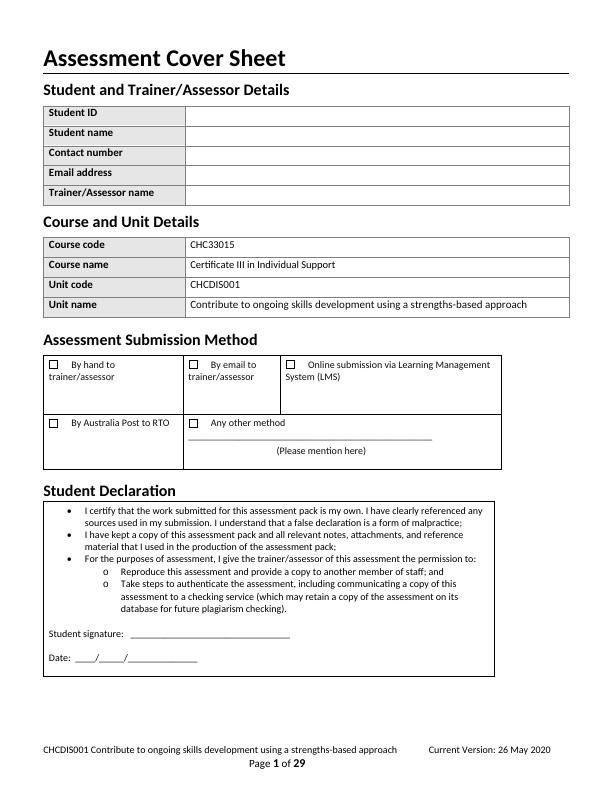
Pre-Assessment Checklist: Task 1 - Knowledge Test
The purpose of this checklist
The pre-assessment checklist helps students determine if they are ready for assessment. The
trainer/assessor must review the checklist with the student before the student attempts the
assessment task. If any items of the checklist are incomplete or not clear to the student, the
trainer/assessor must provide relevant information to the student to ensure they understand the
requirements of the assessment task. The student must ensure they are ready for the assessment
task before undertaking it.
Section 1: Information for Students
Make sure you have completed the necessary prior learning before attempting this assessment.
Make sure your trainer/assessor clearly explained the assessment process and tasks to be
completed.
Make sure you understand what evidence is required to be collected and how.
Make sure you know your rights and the Complaints and Appeal process.
Make sure you discuss any special needs or reasonable adjustments to be considered during the
assessment (refer to the Reasonable Adjustments Strategy Matrix - Appendix A and negotiate these
with your trainer/assessor).
Make sure that you have access to a computer and the internet (if you prefer to type the answers).
Make sure that you have all the required resources needed to complete this assessment task.
The due date of this assessment task is in accordance with your timetable.
In exceptional (compelling and compassionate) circumstances, an extension to submit an
assessment can be granted by the trainer/assessor. Evidence of the compelling and compassionate
circumstances must be provided together with your request for an extension to submit your
assessment work.
The request for an extension to submit your assessment work must be made before the due date.
Section 2: Reasonable adjustments
I confirm that I have reviewed the Reasonable Adjustments guidelines and criteria as provided
in Appendix A and attached relevant evidence as required and select the correct checkbox.
I do require reasonable adjustment
I do not require reasonable adjustment
Declaration (Student to complete)
I confirm that the purpose and procedure of this assessment task has been clearly explained to
me.
I confirm that I have been consulted about any special needs I might have in relation to the
assessment process.
I confirm that the criteria used for this assessment has been discussed with me, as have the
consequences and possible outcomes of this assessment.
I confirm I have accessed and understand the assessment information as provided in the Training
Organisation’s Student Handbook.
I confirm I have been given fair notice of the date, time, venue and/or other arrangements for this
assessment.
I confirm that I am ready for assessment.
Student Name: ______________________________________
Student Signature: ___________________________________
Assessment method-based instructions and guidelines: Knowledge Test
Assessment type
Page 2 of 29
The purpose of this checklist
The pre-assessment checklist helps students determine if they are ready for assessment. The
trainer/assessor must review the checklist with the student before the student attempts the
assessment task. If any items of the checklist are incomplete or not clear to the student, the
trainer/assessor must provide relevant information to the student to ensure they understand the
requirements of the assessment task. The student must ensure they are ready for the assessment
task before undertaking it.
Section 1: Information for Students
Make sure you have completed the necessary prior learning before attempting this assessment.
Make sure your trainer/assessor clearly explained the assessment process and tasks to be
completed.
Make sure you understand what evidence is required to be collected and how.
Make sure you know your rights and the Complaints and Appeal process.
Make sure you discuss any special needs or reasonable adjustments to be considered during the
assessment (refer to the Reasonable Adjustments Strategy Matrix - Appendix A and negotiate these
with your trainer/assessor).
Make sure that you have access to a computer and the internet (if you prefer to type the answers).
Make sure that you have all the required resources needed to complete this assessment task.
The due date of this assessment task is in accordance with your timetable.
In exceptional (compelling and compassionate) circumstances, an extension to submit an
assessment can be granted by the trainer/assessor. Evidence of the compelling and compassionate
circumstances must be provided together with your request for an extension to submit your
assessment work.
The request for an extension to submit your assessment work must be made before the due date.
Section 2: Reasonable adjustments
I confirm that I have reviewed the Reasonable Adjustments guidelines and criteria as provided
in Appendix A and attached relevant evidence as required and select the correct checkbox.
I do require reasonable adjustment
I do not require reasonable adjustment
Declaration (Student to complete)
I confirm that the purpose and procedure of this assessment task has been clearly explained to
me.
I confirm that I have been consulted about any special needs I might have in relation to the
assessment process.
I confirm that the criteria used for this assessment has been discussed with me, as have the
consequences and possible outcomes of this assessment.
I confirm I have accessed and understand the assessment information as provided in the Training
Organisation’s Student Handbook.
I confirm I have been given fair notice of the date, time, venue and/or other arrangements for this
assessment.
I confirm that I am ready for assessment.
Student Name: ______________________________________
Student Signature: ___________________________________
Assessment method-based instructions and guidelines: Knowledge Test
Assessment type
Page 2 of 29
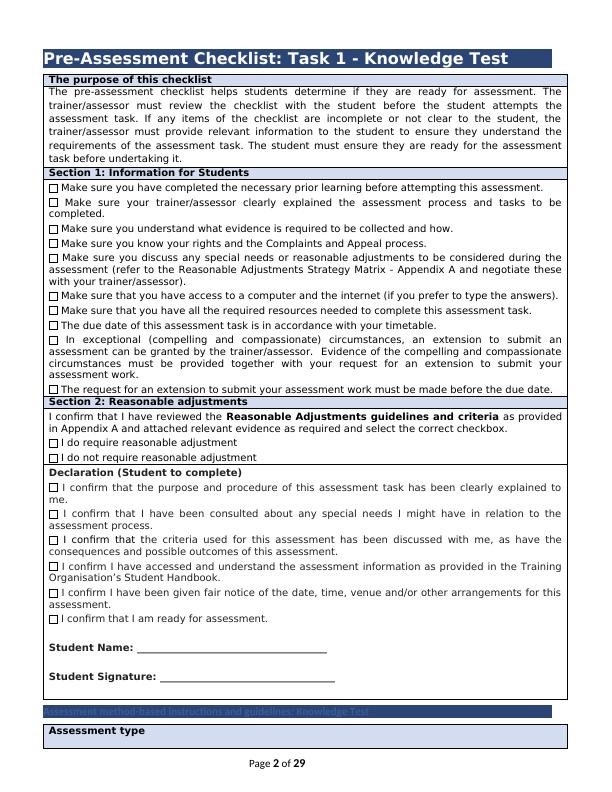
Written Questions
Instructions provided to the student:
Assessment task description:
This is the first (1) assessment task you must successfully complete to be deemed competent
in this unit of competency.
The Knowledge Test is comprised of seventeen (17) written questions
You must respond to all questions and submit them to your Trainer/Assessor.
You must answer all questions to the required level, e.g. provide an answer within the
required word limit, to be deemed satisfactory in this task
You will receive your feedback within two (2) weeks, and you will be notified by your
Trainer/Assessor when your results are available.
Applicable conditions:
All knowledge tests are untimed and are conducted as open book assessment (this means you
can refer to your textbook during the test).
You must read and respond to all questions.
You may handwrite/use a computer to answer the questions.
You must complete the task independently.
No marks or grades are allocated for this assessment task. The outcome of the task will be
Satisfactory or Not Satisfactory.
As you complete this assessment task, you are predominately demonstrating your written
skills and knowledge to your trainer/assessor.
Resubmissions and reattempts:
Where a student’s answers are deemed not satisfactory after the first attempt, a resubmission
attempt will be allowed.
The student may speak to their trainer/assessor if they have any difficulty in completing this
task and require reasonable adjustments.
For more information, please refer to the Training Organisation’s Student Handbook.
Location:
This assessment task may be completed in:
a classroom
learning management system (i.e. Moodle),
workplace,
or an independent learning environment.
Your trainer/assessor will provide you with further information regarding the location for
completing this assessment task.
Instructions for answering the written questions:
Complete a written assessment consisting of a series of questions.
You will be required to answer all the questions correctly.
Do not start answering questions without understanding what is required. Read the questions
carefully and critically analyse them for a few seconds; this will help you to identify what
information is needed in the answer.
Page 3 of 29
Instructions provided to the student:
Assessment task description:
This is the first (1) assessment task you must successfully complete to be deemed competent
in this unit of competency.
The Knowledge Test is comprised of seventeen (17) written questions
You must respond to all questions and submit them to your Trainer/Assessor.
You must answer all questions to the required level, e.g. provide an answer within the
required word limit, to be deemed satisfactory in this task
You will receive your feedback within two (2) weeks, and you will be notified by your
Trainer/Assessor when your results are available.
Applicable conditions:
All knowledge tests are untimed and are conducted as open book assessment (this means you
can refer to your textbook during the test).
You must read and respond to all questions.
You may handwrite/use a computer to answer the questions.
You must complete the task independently.
No marks or grades are allocated for this assessment task. The outcome of the task will be
Satisfactory or Not Satisfactory.
As you complete this assessment task, you are predominately demonstrating your written
skills and knowledge to your trainer/assessor.
Resubmissions and reattempts:
Where a student’s answers are deemed not satisfactory after the first attempt, a resubmission
attempt will be allowed.
The student may speak to their trainer/assessor if they have any difficulty in completing this
task and require reasonable adjustments.
For more information, please refer to the Training Organisation’s Student Handbook.
Location:
This assessment task may be completed in:
a classroom
learning management system (i.e. Moodle),
workplace,
or an independent learning environment.
Your trainer/assessor will provide you with further information regarding the location for
completing this assessment task.
Instructions for answering the written questions:
Complete a written assessment consisting of a series of questions.
You will be required to answer all the questions correctly.
Do not start answering questions without understanding what is required. Read the questions
carefully and critically analyse them for a few seconds; this will help you to identify what
information is needed in the answer.
Page 3 of 29
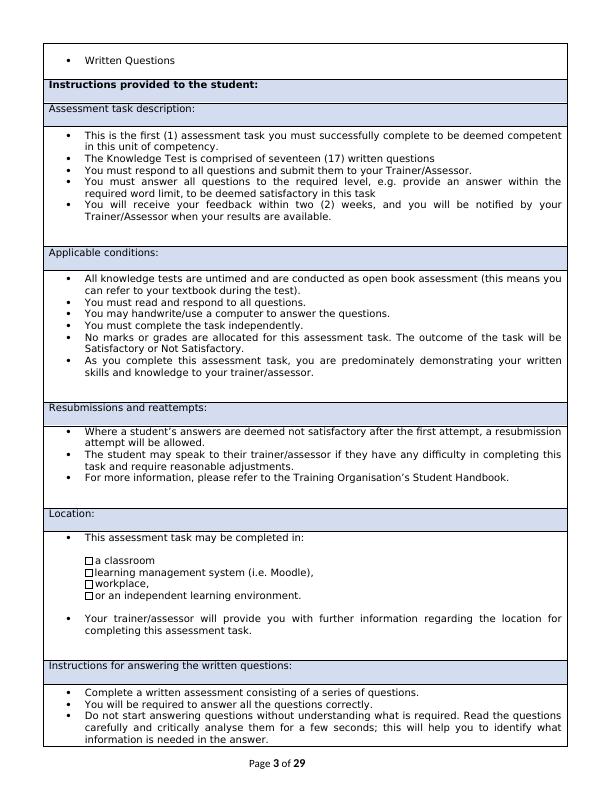
Your answers must demonstrate an understanding and application of the relevant concepts
and critical thinking.
Be concise, to the point and write answers within the word-limit given to each question. Do not
provide irrelevant information. Remember, quantity is not quality.
You must write your responses in your own words.
Use non-discriminatory language. The language used should not devalue, demean, or exclude
individuals or groups based on attributes such as gender, disability, culture, race, religion,
sexual preference or age. Gender-inclusive language should be used.
When you quote, paraphrase, summarise or copy information from other sources to write your
answers or research your work, always acknowledge the source.
Purpose of the assessment
This assessment task is designed to evaluate student’s knowledge essential to assist with supporting
the ongoing skill development of a person with disability and knowledge regarding the following:
Knowledge to current practices, philosophies and theories.
Knowledge to identify and develop social model of disability.
Knowledge to acquire practices which focus on the individual person.
Knowledge to develop concepts of vulnerability, power, independence and interdependence.
Knowledge to recognise assessment processes relating to ongoing skills development.
Knowledge to choose and organise assessments processes and protocols used by the
organisation or service.
Knowledge to identify communication needs, strategies and resources.
Knowledge to identify principles of access and equity.
Knowledge to legal and ethical considerations for working with people with disability.
Knowledge to tools, equipment and other resources used in the learning process.
Knowledge to various teaching and learning strategies.
Knowledge to develop strategies for identifying and maximising informal learning
opportunities.
Knowledge to select services and resources available to people with special needs.
Knowledge to develop strategies to create independence.
Knowledge to incidental learning and the importance of recognising opportunities for learning.
Task instructions
This is an individual assessment.
To ensure your responses are satisfactory, consult a range of learning resources and other
information such as handouts, textbooks, learner resources etc.
To be assessed as Satisfactory in this assessment task, all questions must be answered
correctly.
Page 4 of 29
and critical thinking.
Be concise, to the point and write answers within the word-limit given to each question. Do not
provide irrelevant information. Remember, quantity is not quality.
You must write your responses in your own words.
Use non-discriminatory language. The language used should not devalue, demean, or exclude
individuals or groups based on attributes such as gender, disability, culture, race, religion,
sexual preference or age. Gender-inclusive language should be used.
When you quote, paraphrase, summarise or copy information from other sources to write your
answers or research your work, always acknowledge the source.
Purpose of the assessment
This assessment task is designed to evaluate student’s knowledge essential to assist with supporting
the ongoing skill development of a person with disability and knowledge regarding the following:
Knowledge to current practices, philosophies and theories.
Knowledge to identify and develop social model of disability.
Knowledge to acquire practices which focus on the individual person.
Knowledge to develop concepts of vulnerability, power, independence and interdependence.
Knowledge to recognise assessment processes relating to ongoing skills development.
Knowledge to choose and organise assessments processes and protocols used by the
organisation or service.
Knowledge to identify communication needs, strategies and resources.
Knowledge to identify principles of access and equity.
Knowledge to legal and ethical considerations for working with people with disability.
Knowledge to tools, equipment and other resources used in the learning process.
Knowledge to various teaching and learning strategies.
Knowledge to develop strategies for identifying and maximising informal learning
opportunities.
Knowledge to select services and resources available to people with special needs.
Knowledge to develop strategies to create independence.
Knowledge to incidental learning and the importance of recognising opportunities for learning.
Task instructions
This is an individual assessment.
To ensure your responses are satisfactory, consult a range of learning resources and other
information such as handouts, textbooks, learner resources etc.
To be assessed as Satisfactory in this assessment task, all questions must be answered
correctly.
Page 4 of 29
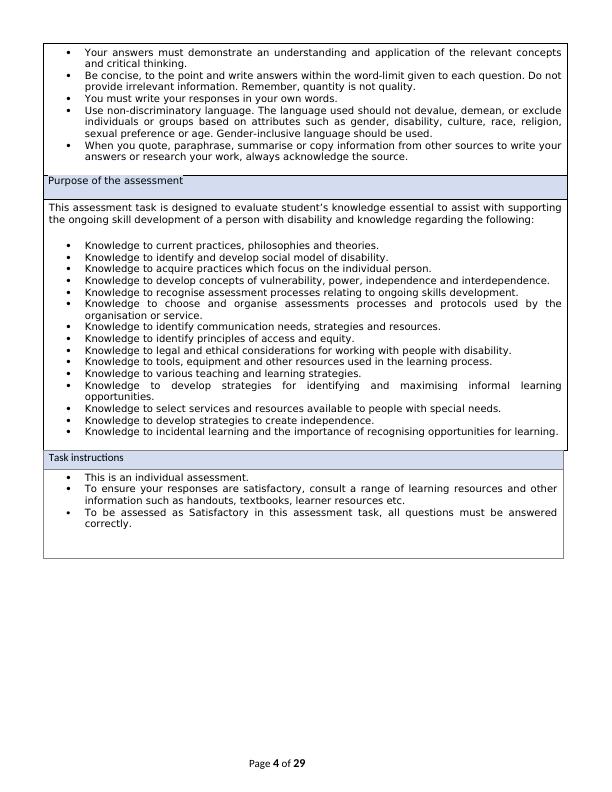
Assessment Task 1: Knowledge Test
Q1: Answer the following questions:
1.1. Describe the social model of disability. Write your
answer in 30-60 words.
1.2. Explain the impact of social devaluation on the quality
of life. Write your answer in 30-60 words.
1.3. Why is it important to maintain competency and image
enhancement for a person with a disability? Write your
answer in 30-60 words.
1.4. What are the four (4) principles of person-centred
practice?
1.5. What are the three (3) aims of a strengths-based
approach?
1.6. Explain the concept of active support in disability in 30-
60 words.
1.7. Explain how person-centred practise supports an
individual person. Write your answer in 30-60 words.
1.8. How can local community education and capacity
building be used to support development? Explain your
answer in 40-70 words.
1.9. Explain the current best practices in disability in 30-60
words.
Satisfactory
response
Yes No
1.1 The social model of disability refers to way of viewing the world, it helps disable
person to view the things. According to this model, people are disabled by barriers in
society, not by difference. There are many barriers like, physical, or any other. This social
model is related to a person’s disadvantage to the combination of personal traits and
social setting.
1.2 Social devaluation can be defined as systematic belief which a group or person has
less social value than others. This devaluation has negative impact on the individual or
group. Socially devaluated parties are having less opportunities and they have to work
hard. Social devaluation has negative impact on the quality of life because people are not
getting opportunities and they have to survive.
1.3 It is important to maintain competency and image enhancement for a person with
disability because image strategies help in improving chances of other people to respond
positively to people who are disable. Competency and image enhancement helps disable
person to get good treatment for other people and society will accept their disability.
When a disable person creates good image in front of others then they can live their life
easily.
1.4 four principles of person centred care: affording people dignity, compassion and
respect, offering coordinated care, support of treatment. These are some principles of
person centred care which can be applied so that they can get well soon.
1.5 three aims of strengths based approach are, promoting the use of informal supportive
networks, offering assertive community involvement and emphasising relationship
between client and manager. It is important to fulfil these aims so that there will be no
issue. These strengths based approach focuses on individual’s strength. This will help in
boosting confidence of individual person and they can perform well.
1.6 active support is a approach of person centred which helps in providing direct support
to individual people. The main aim of active support is to make sure that people with
disabilities get opportunities and they can live their life easily. The goal of active support
Page 5 of 29
Q1: Answer the following questions:
1.1. Describe the social model of disability. Write your
answer in 30-60 words.
1.2. Explain the impact of social devaluation on the quality
of life. Write your answer in 30-60 words.
1.3. Why is it important to maintain competency and image
enhancement for a person with a disability? Write your
answer in 30-60 words.
1.4. What are the four (4) principles of person-centred
practice?
1.5. What are the three (3) aims of a strengths-based
approach?
1.6. Explain the concept of active support in disability in 30-
60 words.
1.7. Explain how person-centred practise supports an
individual person. Write your answer in 30-60 words.
1.8. How can local community education and capacity
building be used to support development? Explain your
answer in 40-70 words.
1.9. Explain the current best practices in disability in 30-60
words.
Satisfactory
response
Yes No
1.1 The social model of disability refers to way of viewing the world, it helps disable
person to view the things. According to this model, people are disabled by barriers in
society, not by difference. There are many barriers like, physical, or any other. This social
model is related to a person’s disadvantage to the combination of personal traits and
social setting.
1.2 Social devaluation can be defined as systematic belief which a group or person has
less social value than others. This devaluation has negative impact on the individual or
group. Socially devaluated parties are having less opportunities and they have to work
hard. Social devaluation has negative impact on the quality of life because people are not
getting opportunities and they have to survive.
1.3 It is important to maintain competency and image enhancement for a person with
disability because image strategies help in improving chances of other people to respond
positively to people who are disable. Competency and image enhancement helps disable
person to get good treatment for other people and society will accept their disability.
When a disable person creates good image in front of others then they can live their life
easily.
1.4 four principles of person centred care: affording people dignity, compassion and
respect, offering coordinated care, support of treatment. These are some principles of
person centred care which can be applied so that they can get well soon.
1.5 three aims of strengths based approach are, promoting the use of informal supportive
networks, offering assertive community involvement and emphasising relationship
between client and manager. It is important to fulfil these aims so that there will be no
issue. These strengths based approach focuses on individual’s strength. This will help in
boosting confidence of individual person and they can perform well.
1.6 active support is a approach of person centred which helps in providing direct support
to individual people. The main aim of active support is to make sure that people with
disabilities get opportunities and they can live their life easily. The goal of active support
Page 5 of 29
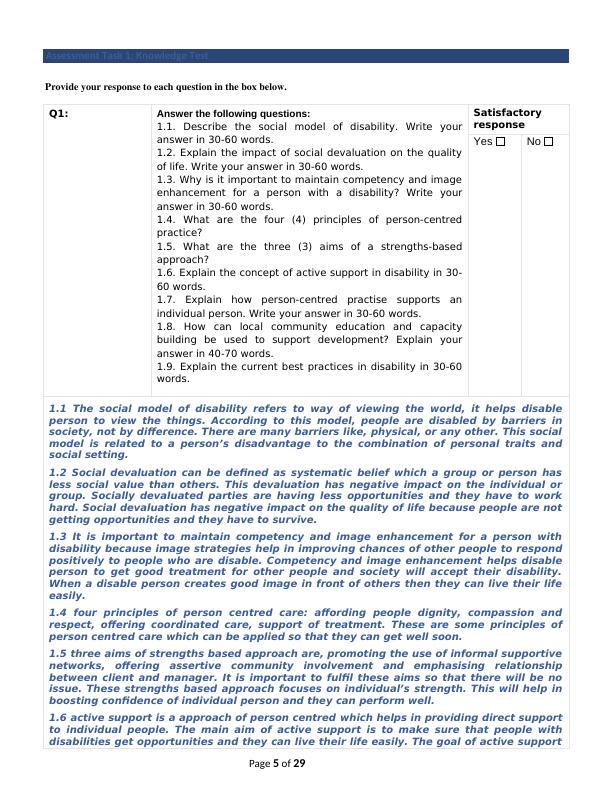
is to focus on people who are disable and provide them all the facilities.
1.7 Person centred practice support individuals as it focuses on improving health of an
individual person. The focus is on what they can do, abilities they are having, not their
disability or condition. Support centred practice focuses on achieving person’s aspirations
and identify ways by which they can boost confidence of disable persons. It will help them
in learning new things and they can do work easily.
1.8 local community education and capacity building be used to support development and
make positive contribution. Capacity building is important for development of community
because it is valuable and have long term impact. It fosters a sense of ownership and
empowerment. This helps in development of community and contribute positively in
achieving goals and objectives. It is essential to educate local community so that they can
get relevant information and make contribution in development.
1.9 current best practices in disability are, provide good services to people who are
disable and remove all the barriers. Disable people should get all the necessary facilities
which will help them in living their life safely. Removal of barriers will help in further
study of persons who are disable and get better opportunities in future. Disable persons
are also having right to education and enjoy their life.
Page 6 of 29
1.7 Person centred practice support individuals as it focuses on improving health of an
individual person. The focus is on what they can do, abilities they are having, not their
disability or condition. Support centred practice focuses on achieving person’s aspirations
and identify ways by which they can boost confidence of disable persons. It will help them
in learning new things and they can do work easily.
1.8 local community education and capacity building be used to support development and
make positive contribution. Capacity building is important for development of community
because it is valuable and have long term impact. It fosters a sense of ownership and
empowerment. This helps in development of community and contribute positively in
achieving goals and objectives. It is essential to educate local community so that they can
get relevant information and make contribution in development.
1.9 current best practices in disability are, provide good services to people who are
disable and remove all the barriers. Disable people should get all the necessary facilities
which will help them in living their life safely. Removal of barriers will help in further
study of persons who are disable and get better opportunities in future. Disable persons
are also having right to education and enjoy their life.
Page 6 of 29
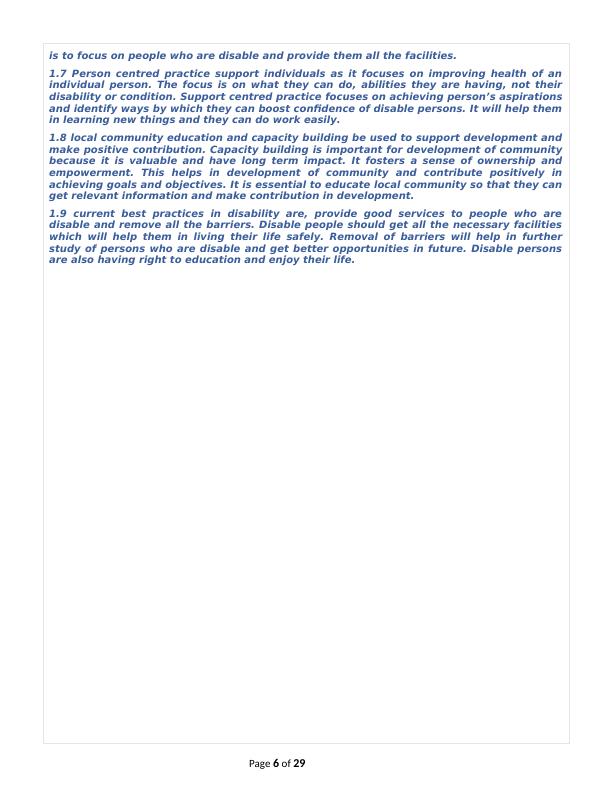
End of preview
Want to access all the pages? Upload your documents or become a member.
Related Documents
Unit Assessment Pack (UAP) – Cover Sheet for CHCDIS002lg...
|23
|5741
|230
CHCCCS011 Unit Assessment Pack (UAP) – Cover Sheet and Trainer/Assessor Detailslg...
|17
|4122
|370
HLTAAP001 Recognise Healthy Body Systems Assessment Task 2lg...
|23
|5113
|146
CHCCOM005 Unit Assessment Pack - Case Studies and Communication Strategieslg...
|20
|3506
|442
CHCDIS003 Assessment Cover Sheet and Skills Test - Deskliblg...
|20
|4431
|79
Assessment for CHCDIS001 .lg...
|35
|5197
|74